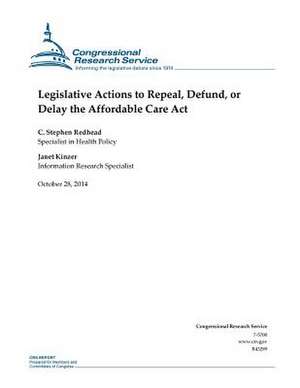Legislative Actions to Repeal, Defund, or Delay the Affordable Care ACT
Autor Congressional Research Serviceen Limba Engleză Paperback
| Toate formatele și edițiile | Preț | Express |
|---|---|---|
| Paperback (3) | 122.20 lei 3-5 săpt. | |
| CREATESPACE – | 122.20 lei 3-5 săpt. | |
| CREATESPACE – | 122.43 lei 3-5 săpt. | |
| CREATESPACE – | 122.61 lei 3-5 săpt. |
Preț: 122.20 lei
Nou
Puncte Express: 183
Preț estimativ în valută:
23.39€ • 24.33$ • 19.31£
23.39€ • 24.33$ • 19.31£
Carte disponibilă
Livrare economică 24 martie-07 aprilie
Preluare comenzi: 021 569.72.76
Specificații
ISBN-13: 9781503089808
ISBN-10: 1503089800
Pagini: 26
Dimensiuni: 216 x 279 x 1 mm
Greutate: 0.09 kg
Editura: CREATESPACE
ISBN-10: 1503089800
Pagini: 26
Dimensiuni: 216 x 279 x 1 mm
Greutate: 0.09 kg
Editura: CREATESPACE
